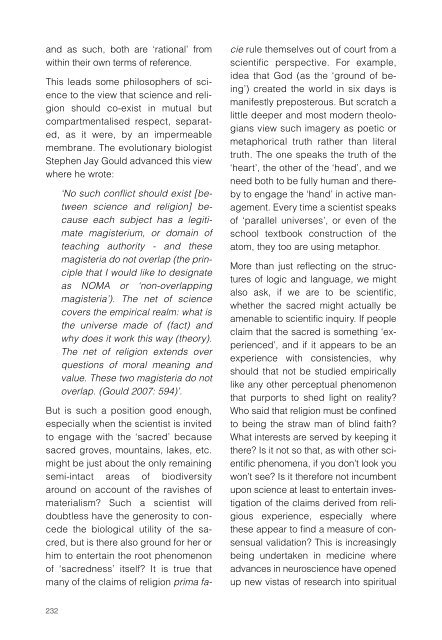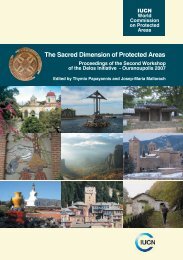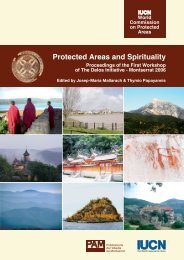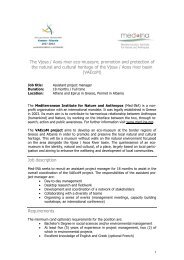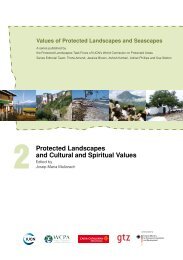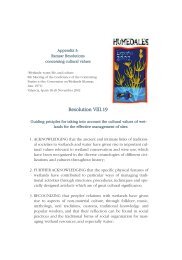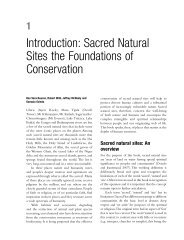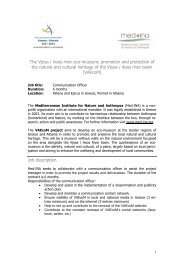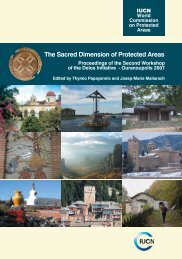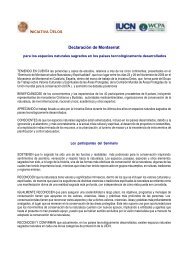The Diversity of Sacred Lands in Europe - IUCN
The Diversity of Sacred Lands in Europe - IUCN
The Diversity of Sacred Lands in Europe - IUCN
Create successful ePaper yourself
Turn your PDF publications into a flip-book with our unique Google optimized e-Paper software.
and as such, both are ‘rational’ from<br />
with<strong>in</strong> their own terms <strong>of</strong> reference.<br />
This leads some philosophers <strong>of</strong> science<br />
to the view that science and religion<br />
should co-exist <strong>in</strong> mutual but<br />
compartmentalised respect, separated,<br />
as it were, by an impermeable<br />
membrane. <strong>The</strong> evolutionary biologist<br />
Stephen Jay Gould advanced this view<br />
where he wrote:<br />
‘No such conflict should exist [between<br />
science and religion] because<br />
each subject has a legitimate<br />
magisterium, or doma<strong>in</strong> <strong>of</strong><br />
teach<strong>in</strong>g authority - and these<br />
magisteria do not overlap (the pr<strong>in</strong>ciple<br />
that I would like to designate<br />
as NOMA or ‘non-overlapp<strong>in</strong>g<br />
magisteria’). <strong>The</strong> net <strong>of</strong> science<br />
covers the empirical realm: what is<br />
the universe made <strong>of</strong> (fact) and<br />
why does it work this way (theory).<br />
<strong>The</strong> net <strong>of</strong> religion extends over<br />
questions <strong>of</strong> moral mean<strong>in</strong>g and<br />
value. <strong>The</strong>se two magisteria do not<br />
overlap. (Gould 2007: 594)’.<br />
But is such a position good enough,<br />
especially when the scientist is <strong>in</strong>vited<br />
to engage with the ‘sacred’ because<br />
sacred groves, mounta<strong>in</strong>s, lakes, etc.<br />
might be just about the only rema<strong>in</strong><strong>in</strong>g<br />
semi-<strong>in</strong>tact areas <strong>of</strong> biodiversity<br />
around on account <strong>of</strong> the ravishes <strong>of</strong><br />
materialism? Such a scientist will<br />
doubtless have the generosity to concede<br />
the biological utility <strong>of</strong> the sacred,<br />
but is there also ground for her or<br />
him to enterta<strong>in</strong> the root phenomenon<br />
<strong>of</strong> ‘sacredness’ itself? It is true that<br />
many <strong>of</strong> the claims <strong>of</strong> religion prima facie<br />
rule themselves out <strong>of</strong> court from a<br />
scientific perspective. For example,<br />
idea that God (as the ‘ground <strong>of</strong> be<strong>in</strong>g’)<br />
created the world <strong>in</strong> six days is<br />
manifestly preposterous. But scratch a<br />
little deeper and most modern theologians<br />
view such imagery as poetic or<br />
metaphorical truth rather than literal<br />
truth. <strong>The</strong> one speaks the truth <strong>of</strong> the<br />
‘heart’, the other <strong>of</strong> the ‘head’, and we<br />
need both to be fully human and thereby<br />
to engage the ‘hand’ <strong>in</strong> active management.<br />
Every time a scientist speaks<br />
<strong>of</strong> ‘parallel universes’, or even <strong>of</strong> the<br />
school textbook construction <strong>of</strong> the<br />
atom, they too are us<strong>in</strong>g metaphor.<br />
More than just reflect<strong>in</strong>g on the structures<br />
<strong>of</strong> logic and language, we might<br />
also ask, if we are to be scientific,<br />
whether the sacred might actually be<br />
amenable to scientific <strong>in</strong>quiry. If people<br />
claim that the sacred is someth<strong>in</strong>g ‘experienced’,<br />
and if it appears to be an<br />
experience with consistencies, why<br />
should that not be studied empirically<br />
like any other perceptual phenomenon<br />
that purports to shed light on reality?<br />
Who said that religion must be conf<strong>in</strong>ed<br />
to be<strong>in</strong>g the straw man <strong>of</strong> bl<strong>in</strong>d faith?<br />
What <strong>in</strong>terests are served by keep<strong>in</strong>g it<br />
there? Is it not so that, as with other scientific<br />
phenomena, if you don’t look you<br />
won’t see? Is it therefore not <strong>in</strong>cumbent<br />
upon science at least to enterta<strong>in</strong> <strong>in</strong>vestigation<br />
<strong>of</strong> the claims derived from religious<br />
experience, especially where<br />
these appear to f<strong>in</strong>d a measure <strong>of</strong> consensual<br />
validation? This is <strong>in</strong>creas<strong>in</strong>gly<br />
be<strong>in</strong>g undertaken <strong>in</strong> medic<strong>in</strong>e where<br />
advances <strong>in</strong> neuroscience have opened<br />
up new vistas <strong>of</strong> research <strong>in</strong>to spiritual<br />
232


